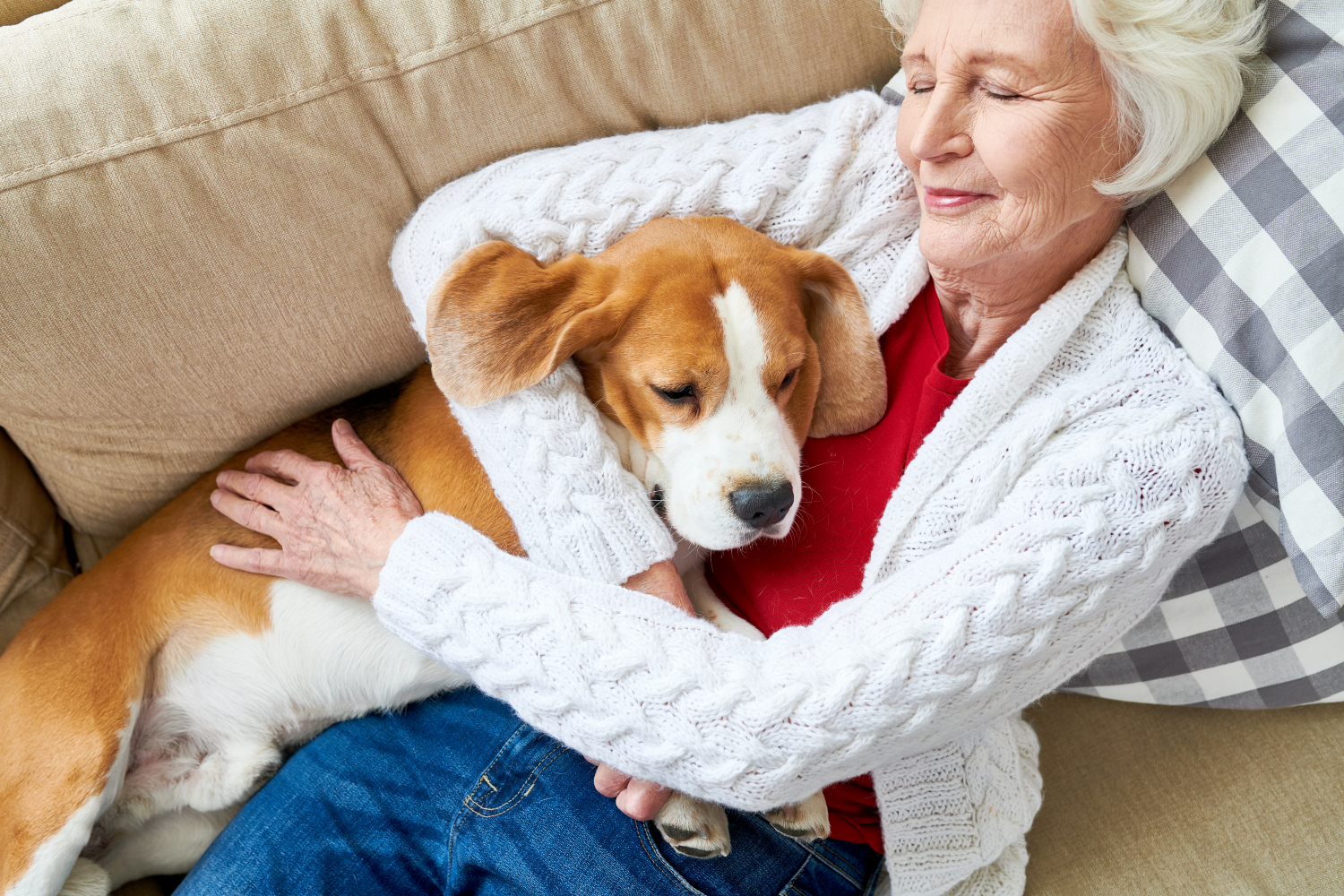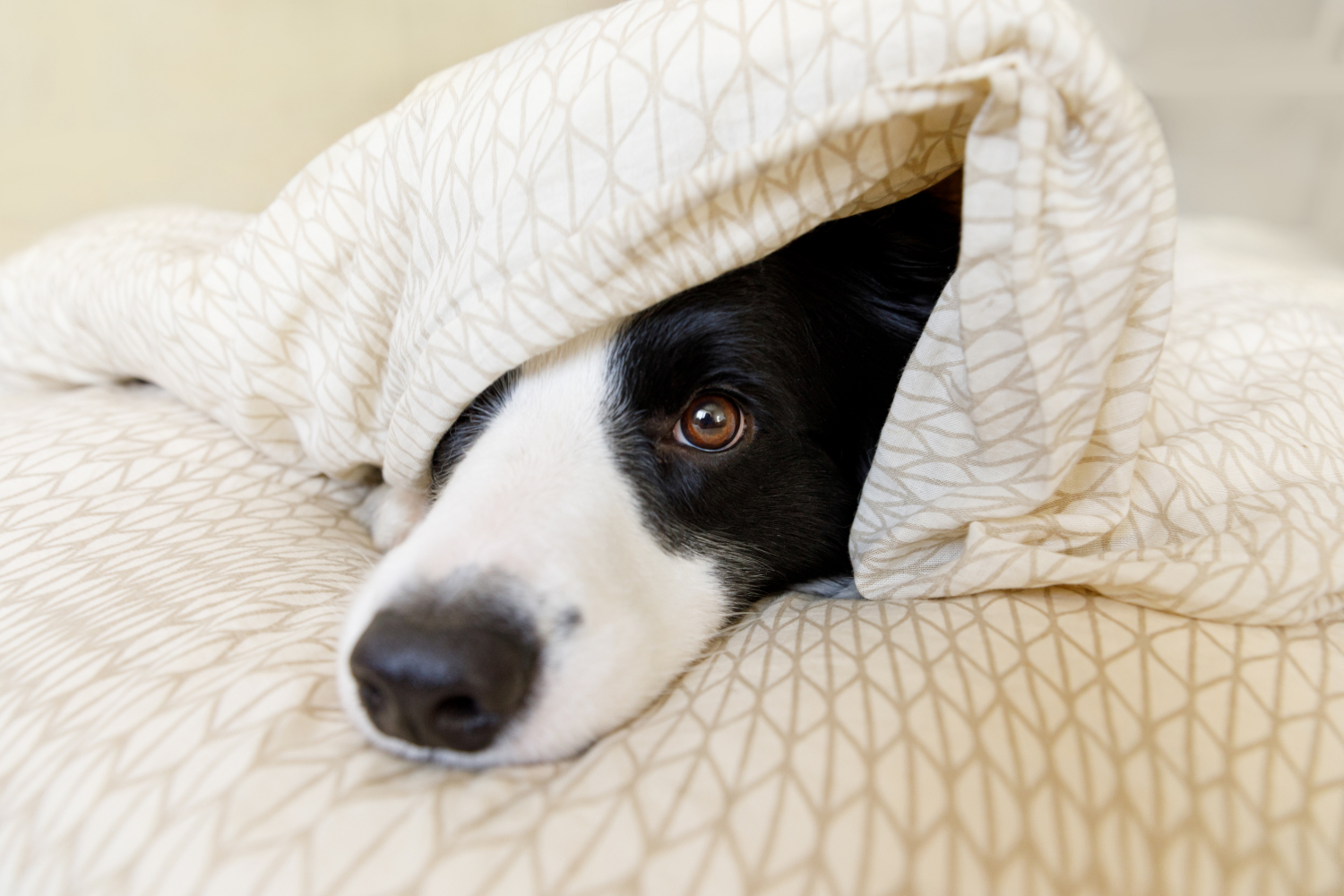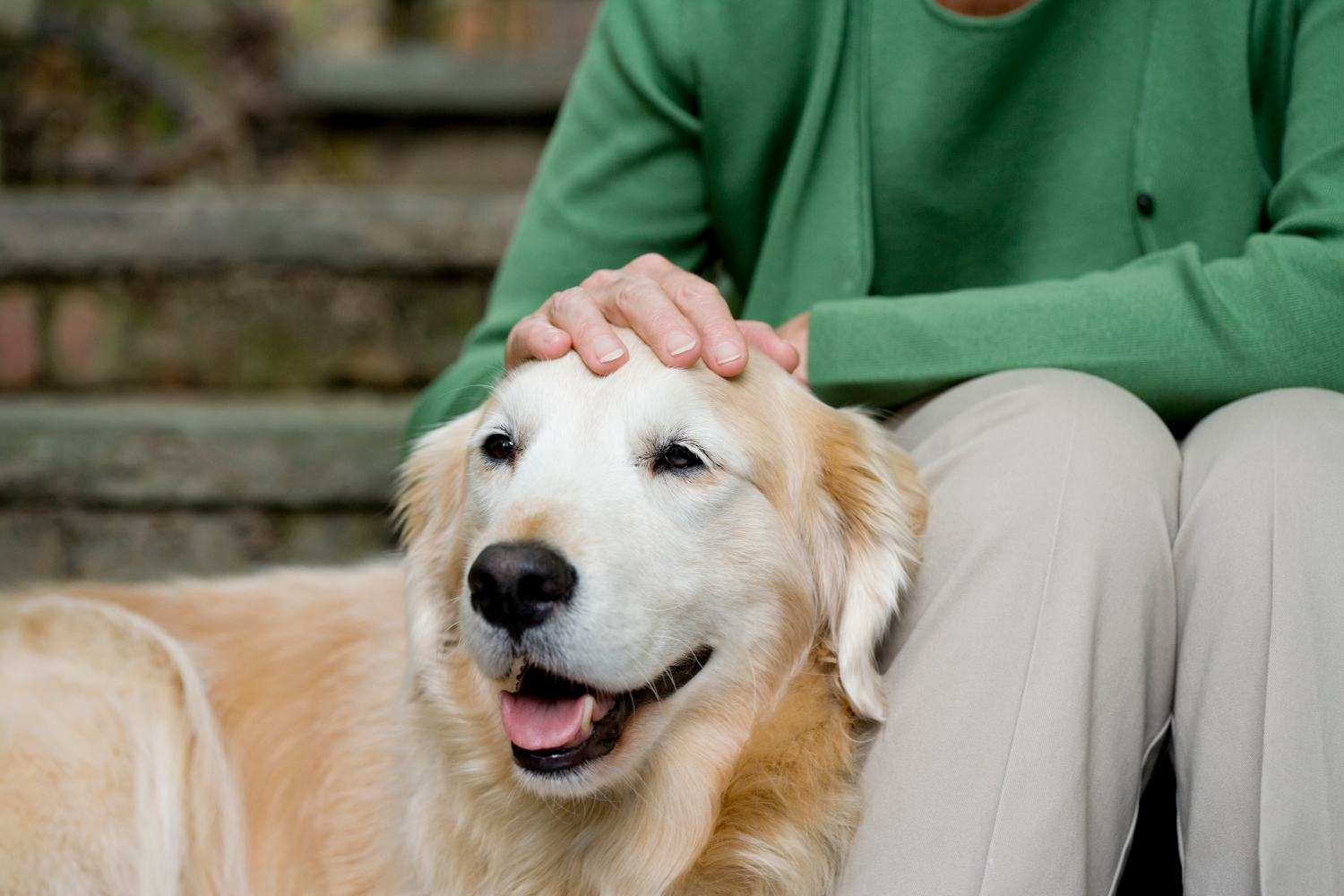
Sleeping problems in older dogs
3rd January, 2023
Is your old dog tossing and turning every night and you’re worried why? Find out what’s causing these sleeping problems and what to do about it in this Petwise guide.
It’s no secret that dogs love to snooze, and they can often be found dozing during the day when there’s nothing going on.
An adult dog will need around 12-14 hours a day, and this can be even more when they’re puppies or when they enter their golden years.
Sometimes, though, something gets in the way of a restful night's sleep for your senior pooch, which can lead to other health issues.
So, how can you overcome sleeping issues in your ageing pet and make sure they get the right amount of shut eye night after night?
Our Petwise guide on sleeping problems in older dogs tells you what might be causing their troubles and what you can do to help.
You’ll also discover where to find pet insurance for dogs to take away the financial worry of emergency care for your faithful friend when they need it most.
Do dogs sleep more when they get old?
As we age, most of us enjoy an earlier bedtime or to get up a little later at the weekends. We might even be prone to the odd nap or two!
Our canine companions are just the same, and as they enter their golden years, they are much more likely to be found curled up in a cosy spot somewhere at home.
Older dogs tend to sleep more because they don’t have the same amount of energy they once did, they tire out quicker, and they might also be suffering from health concerns that cause fatigue.
While some canines appear to be spending more time in bed, others can’t get a good night’s sleep however much they try, which can also be due to a problem with their health – we’ll take a look at some causes of sleep issues below.
Getting enough sleep each night is crucial for your dog’s wellbeing, and sleep deprivation can cause a host of other problems, including:
- Weakened immune system
- Higher risk of infection
- Other behavioural issues
- A build-up of stress hormones
If you’re concerned about your old dog’s sleeping habits, it’s a good idea to get them checked by the vet.
If you have pet insurance for dogs with Petwise, you can use our 24/7 vet video consultation service for professional advice.
How to spot a sleeping problem in a dog
Before we look at what’s causing your pet’s sleep issues, let’s look at how to spot the problem in the first place. It’s important to get to know your dog’s sleeping patterns so you can identify when something’s not right.
Depending on the root of the problem, you may notice the following symptoms of poor sleep:
- Reluctance to get out of bed and go on walks
- Tossing and turning in bed
- Difficulty waking up
- Sleeping a lot more or less than they used to
- Very loud and/or constant snoring
If you feel something is wrong and that your canine companion isn’t resting as it should, contact your vet. Make sure you have pet insurance for dogs in place to help cover the costs of any emergency care and treatment they might need.
Common reasons for sleep problems in older dogs
Diagnosing your dog’s sleeping issues isn’t always straightforward. There are a number of factors that can be causing them to snooze more or less than they should.
To help you identify why your senior pet’s sleeping habits are changing, here are a few common causes and symptoms to look out for.
Tummy troubles
Problems with your four-legged friend’s digestive tract can cause a lot of discomfort, which could easily disturb them during the night.
It might be a short bout of diarrhoea that will clear up in a day or two, but it could also be a sign of something chronic and more serious.
Look out for the accompanying signs that mean your pet isn’t sleeping due to stomach issues:
- Loss of appetite
- Excessive drooling
- Lip smacking
- Panting (Read our recent blog on heavy panting in older dogs to understand other reasons in which your older pup may be panting)
- Vomiting and diarrhoea
To check your senior dog isn’t suffering from a severe condition, call your vet.
Alternatively, use the vet video consultation service if you have pet insurance for dogs with Petwise.
They are in pain
A common cause of restless nights in canines is pain. There are a host of medical issues that can cause your dog’s body to hurt, which is why it’s vital to take your pet to the vet when you notice something seems ‘off’.
Dogs in pain might develop an increased heart rate, become restless when in their bed, and even struggle to lie down, especially if they have arthritis or a slipped disc.
If this is the cause for their inability to snooze, your vet can come up with a treatment plan, including medication and other care that you can help with at home.
If they have arthritis, an orthopaedic bed might help your pet rest better.
They feel anxious
It’s not only people who experience anxiety. Dogs can become anxious for many reasons, and it can affect their sleep, just like it can ours.
It’s not always easy to spot this cause, though, as the symptoms are similar to other reasons for bad sleep.
It might be easier to identify if you know what creates anxiety in canines. There are a few possibilities that can trigger these emotions:
- A storm
- A change in your dog's environment
- Not enough exercise or stimulation in a day
- Being left alone too long
Your dog might pace up and down or start to whine and bark more often than it used to if they feel anxious. You’ll need to work with the vet to identify the cause before treating their condition appropriately.
Outside disturbances
Have you ever spent hours awake because of a flickering street light or noisy neighbours? You’re not alone. Your ageing pet might get disturbed more easily at night and find it hard to relax with outdoor stimuli, such as:
- Nocturnal critters in the garden
- A female dog in heat nearby (if they’re not neutered)
- Noisy neighbours or early morning bin men
- A new dog on your street barking at all hours
- Excessive light from an outside source
If it’s a one-off occurrence, your pet should return to normal the next night. If you find the disturbance is ongoing and affecting your dog’s ability to rest, you’ll need to do everything possible to eliminate the stimuli from their environment.
Keep your four-legged friend’s bed in the quietest part of the house and make sure all windows and curtains are closed to stop noise and light from flooding in.
Sleep apnoea
This sleep issue isn’t common in all breeds, but some are more predisposed than others, like flat-faced dogs such as Boston Terriers.
If your older dog is overweight, they’re also at higher risk.
What happens to your dog if they suffer from this condition?
Their respiratory airways collapse or narrow temporarily, causing them to stop breathing and suddenly wake up for a few seconds. When this happens constantly throughout the night, your pet may feel sluggish and tired the next morning.
A common sign your four-legged friend has sleep apnoea is loud, chronic snoring along with being lethargic throughout the day.
If you suspect your dog has this issue, take them to the vet immediately. Sleep apnoea can become life-threatening if left untreated.
Treatment can get expensive when your ageing hound develops a condition like this, especially if your pet needs to go on a special diet to lose weight or even have surgery.
That’s why pet insurance for dogs is essential to protect your pooch and make sure you can afford all the emergency care they need.
Insomnia

This issue is usually the result of another problem, like:
- Pain
- Anxiety
- Discomfort
- Outside distractions
- Incontinence
All the above mean your pet wakes up more than normal as it isn’t relaxed enough to fall asleep and stay that way. You’ll need to take them to the vet to discuss treatment options depending on their condition.
A little further down, you’ll learn some excellent ways to help your senior hound get a better night’s rest.
Cognitive dysfunction
A recent study by published in Scientific Reports, highlighted that with each year of life after the age of 10, dogs are more susceptible to developing cognitive dysfunction by 52%.
The issue is very much like Alzheimer’s in people and sometimes called doggy dementia. It causes your senior canine to feel confused, which messes up their sleep patterns as a result.
It’s not unusual to see dogs with cognitive dysfunction sleep more in the day and wake throughout the night.
Unfortunately, there is no cure for this condition, but if it’s caught early, prescription medication can help manage it.
This highlights why frequent veterinary checks are so important. They aren’t included under pet insurance for dogs but are an essential part of budgeting for a canine to detect health issues before they become seriously ill.
A natural art of ageing
We all have a different sleep pattern to when we were young, and our four-legged friends are just the same. As they progress through the developmental stages of life, it’s inevitable it will impact their sleep quality.
Do you find yourself waking up to go to the loo more and more as you age? If your dog seems restless and whimpers by the back door throughout the night, it’s likely they are experiencing the same issue!
There could be a more serious underlying problem, though, so get your pet to the vet for a check. Common health concerns that make dogs need to go to the toilet more frequently as they age include:
- Kidney disease
- Urinary tract infections (UTIs)
- Diabetes
- Other gastrointestinal issues
How to improve your ageing dog’s sleeping habits
You know your beloved dog is having trouble sleeping and want to do something about it, but how can you make sure your ageing dog dozes off easily and stays that way until morning?
We’ve got some helpful tips that might help your old friend (and you) get a bit more shut eye during the twilight hours.
Rule out medical conditions
Before you start trying out the various ways to get your canine sleeping better, you should take them to the vet. A professional can rule out any possible medical causes for their night-time disruptions.
If your ageing dog does have an underlying health concern, your vet can prescribe treatment depending on the issue, which could include:
- A special diet
- Therapy
- Medication
- Natural supplements
- Surgery
It’s important you have pet insurance for dogs to help cover the costs of extensive treatments.
With Petwise, you could get additional benefits like a senior dog food contribution for special diets and dental cover included as standard, which can be a great help if oral hygiene is causing pain and difficulty sleeping.
Once you rule out serious medical causes, it’s time to try other ways to help your ageing pet get a good night’s sleep.
Keep them active and stimulated in the daytime
Do you find you sleep much better if you’ve had a busy day? Taking your dog on plenty of walks and playing fetch work in a similar way and may encourage better sleep.
Mental stimulation is just as important, so keep your dog’s mind busy with food puzzle toys and a game of hide and seek.
Your aim is to make sure your senior pooch is tired when it’s time to go to bed. Don’t go out too close to bedtime, though, as dogs also need some time to wind down like we do.
Help with toilet issues
If your ageing canine companion has started wetting the bed or going to the toilet on your furniture, they need your help.
Let them out in the garden just before bed if you can or take them for a quick 5 minutes around the block for one last pee.
If they get up a lot during the night, you might have to consider getting a large litter tray or buying some training pads. Make sure the path to their indoor toilet is easily navigable and has a non-slip runner or flooring under foot.
Make sure they are comfortable
If your dog’s bed has lost its plumpness, it won’t provide the support it needs for a restful night’s sleep. A heated or orthopaedic bed is perfect for older joints and muscles.
Other tips to encourage your pet to snooze all night long include:
- Take them out to go to the toilet before bed.
- Make sure they are well fed and have had a drink.
- Check the room temperature is comfortable.
- Consider white noise if outdoor sounds are keeping them awake.
Stick to a routine
Dogs are very much like children in that they love routine. Calming down with a nightly ritual before bed can really help them wind down and get some well-needed shuteye.
Adapt to their needs
As your loyal companion ages, it’s more likely to feel vulnerable, and separation anxiety that it had as a youngster can come creeping back.
Senior canines like to feel their owner’s presence to feel safe, which means you might need to change the sleeping arrangements when they reach old age.
Before hauling their bed into your room, you can try a few tactics to help them feel emotionally secure:
- If slippery floors are making an arthritic dog fearful, install carpet or non-slip flooring.
- Add a small night light by its bed if they do wake up and wander.
- Consider a pheromone diffuser. These can help combat anxiety.
- A padded crate or high-sided bed can give canines an added sense of security.
- Lay a piece of your unwashed clothing beside them for familiarity.
If all else fails, sleeping in your bedroom might be the only thing that allows them and you to get a decent sleep.
Can I give my dog melatonin?
According to the NHS, melatonin is a hormone that our brain produces naturally and helps control our sleep patterns. Melatonin levels can drop as you get older.
For humans who suffer from bad sleep, synthetic melatonin is available in tablet form or as teas and tinctures.
If you find it helps you drop off at night, you might be wondering if your four-legged family member can try the same supplements.
Although hard scientific evidence is still lacking, there are plenty of anecdotal reports that say melatonin can help canines sleep better and has a very low risk of harmful side effects.
There are various doggy melatonin products available, but it’s a good idea to speak with your vet first or use the Petwise 24/7 vet video consultation service if you have pet insurance for dogs with us.
A professional can help you decide if it’s the right choice for your animal and give you some recommendations on the best dosage and products to use.
Pet insurance to protect your senior pooch

While your older dog’s sleeping problems might just be down to age, they could also be a sign of more serious health concerns.
Protecting your four-legged friend with pet insurance for dogs makes sure they get emergency care when they need it most by taking away possible financial worries.
Lifetime coverage can help you financially when faced with an unexpected vet’s bill for your ageing canine’s care.
Why choose Petwise to get pet insurance for dogs? We believe that every canine should enjoy the life it deserves, which is why we have no upper age joining limit.
Our plans come with dental cover included as standard* and you can also use our 24-hour vet video consultation service when you need some quick professional advice.
Get in touch with the Petwise team today to protect your ageing dog through its golden years.
*Terms and conditions still apply